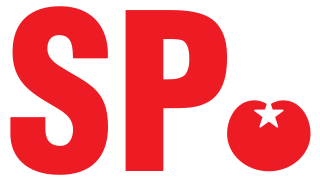This article relies too much on references to primary sources .(May 2017) (Learn how and when to remove this template message) |
Forum for Democracy (Dutch : Forum voor Democratie, FvD) is a conservative, Eurosceptic political party in the Netherlands, founded as a think tank by Thierry Baudet who has been the party's leader since its founding in late 2016.

Dutch(
Conservatism is a political and social philosophy promoting traditional social institutions in the context of culture and civilization. The central tenets of conservatism include tradition, human imperfection, hierarchy, authority, and property rights. Conservatives seek to preserve a range of institutions such as monarchy, religion, parliamentary government, and property rights, with the aim of emphasizing social stability and continuity. The more extreme elements—reactionaries—oppose modernism and seek a return to "the way things were".

Euroscepticism means criticism of the European Union (EU) and European integration. It ranges from those who oppose some EU institutions and policies and seek reform, to those who oppose EU membership outright and see the EU as unreformable. The opposite of Euroscepticism is known as pro-Europeanism.
Contents
- History
- Ideology
- Economy
- Electoral reform
- Immigration and EU
- Election results
- Lower House
- Upper House
- Provincial
- Municipal
- Party membership
- Organisation
- Leadership
- Party Board
- References
- External links
The party first participated in elections in the 2017 general election, winning two seats in the House of Representatives, then became the first political force in the 2019 provincial elections.

The House of Representatives is the lower house of the bicameral parliament of the Netherlands, the States General, the other one being the Senate. It has 150 seats which are filled through elections using a party-list proportional representation. It sits in the Binnenhof in The Hague.

Provincial elections were held in the Netherlands on 20 March 2019. Eligible voters elected the members of the Provincial States in the twelve provinces of the Netherlands. The elections were held on the same day as the water board elections and, in the Caribbean Netherlands, island council elections.
It is seeking membership of the European Conservatives and Reformists, a political grouping in the European Parliament.

The European Conservatives and Reformists (ECR) is a Eurosceptic and anti-federalist political group in the European Parliament. The ECR is the parliamentary group of the Alliance of Conservatives and Reformists in Europe (ACRE) European political party, but also includes MEPs from four other European parties and thirteen MEPs without European party affiliation. The group focuses on reforming the European Union (EU) on the basis of Eurorealism as opposed to total rejection of the EU (anti-EU-ism).

The European Parliament (EP) is the only parliamentary institution of the European Union (EU) that is directly elected by EU citizens aged 18 or older. Together with the Council of the European Union, which should not be confused with the European Council and the Council of Europe, it exercises the legislative function of the EU. The Parliament is composed of 751 members (MEPs), that will become 705 starting from the 2019–2024 legislature, who represent the second-largest democratic electorate in the world and the largest trans-national democratic electorate in the world.














